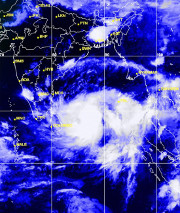
SE Asia (MNN) — In Matthew, Jesus says faith can move mountains. Updates from Southeast Asia show that it can move cyclones, too.
Early last week, Cyclone Mahasen was expected to bring death and destruction to the coastlines of Burma and Bangladesh.
"Last time we talked, I asked people to pray for the weather to change and for the damage to be minimal," says Oddny Gumaer of Partners Relief and Development. "We were very worried because there were all these Internally Displaced People, refugees, living on the beach in really primitive shacks."
Approximately 140,000 Rohingya refugees living on the shoreline of Burma's Arakan state were facing certain death. In Bangladesh, one million people were evacuated from the coastline in preparation for the storm.
Cyclones are an annual occurrence in the Bay of Bengal. Some communities are still trying to recover from past storms and the damage they've inflicted, such as 2008's Cyclone Nargis. This severe storm stands as one of the worst in Burma's recorded history and killed over 130,000 people in four countries.
As storm clouds approached Bangladesh last week, KP Yohannan with Gospel for Asia (GFA)'s says, "Lots of people were gathering in our churches; people [were] praying for God to have mercy."
Thankfully, "just hours before the cyclone was supposed to hit the shores…it changed direction," Gumaer reports.
Mahasen made landfall in Bangladesh Thursday as a tropical storm. Though half the storm it used to be, Mahasen still managed to cause significant damage in one of Southeast Asia's poorest countries.
The storm surge destroyed thousands of small huts and shacks, leaving hundreds of thousands of people homeless or displaced. GFA says the 13 deaths reported so far may be grossly underestimated, because Mahasen ripped through mainly rural areas.
Trained and equipped for rapid response, GFA missionaries are delivering food, clothing, and temporary shelter. But the real work hasn't even begun yet, says Yohannan.
"The rebuilding process takes a long time, and that's what our people are engaged in," he states.
"It will take a minimum of six months after the waters subside and land is cleared, for these poor people to come back and find out they have nothing left."
That's where GFA Bridge of Hope centers and national missionaries come in.
"People need to hear hope, and that's what our people do," Yohannan says.
You can support either of those ministries by clicking the hyper-linked words above, or click here to visit GFA.org.
In neighboring Burma, Partners is engaged in the recovery process, too.
"We are now in the process of bringing all the thousands of people back into their camps from the places they were evacuated to," Gumaer explains.
But they're not coming back to home sweet home.
"Even though the storm didn't wipe them out, they are still in a very, very difficult place," says Gumaer.
"They do need a lot of help, they need a lot of prayer, they need a change to their situation. And the government really needs to get involved in helping these people."
Click here to send help through Partners Relief and Development.
Yohannan points to Cyclone Mahasen as a lesson for the Body of Christ.
"[In] any of these situations around the world, when we see earthquake or war or cyclone or tsunami, we need to engage in prayer. God does intervene in the affairs of men."
.jpg)